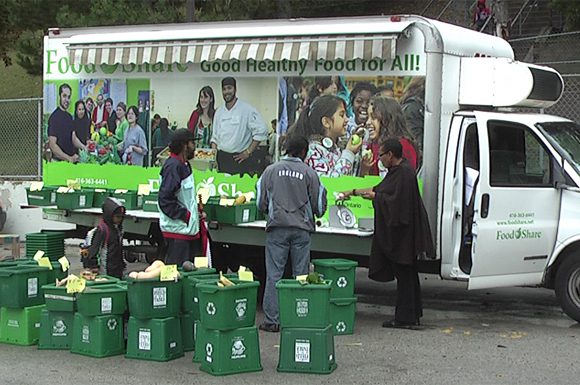The parking lot at 90 Mornelle Ct. is nestled by high-rise apartment buildings. Fast food joints and convenience stores are steps away while the two nearest grocery stores are both located up steep hills.
But at this parking lot, on a wet and windy October morning, Marlon Neil and his son Israel have bought plantain, ginger, grapes, carrots and much more.
Every week, the Mobile Good Food Market sends a box truck full of nutritious food to Toronto’s food deserts — high-population areas where fresh food is far and expensive — to be sold at wholesale prices.
Apartment dwellers can buy fresh vegetables right outside their homes, thanks to a pilot project by Toronto non-profit FoodShare,
“I don’t really drive right now,” said Neil. “So it’s really hard to actually get good, fresh vegetarian food, even at the grocery store.”
He’s among 79 per cent of customers who visit the truck every week.
“Coming here it’s always fresh, always nice. And there’s good company.”

FoodShare’s Afua Asantewaa (L) and Serge Slipachenko pack fruits and vegetables on the eve of a Mobile Good Food Market distribution day.
Since July, the truck stops weekly at eight low-income neighbourhoods: four Scarborough public housing sites on Wednesdays, and four west-end neighbourhoods on Thursdays.
FoodShare uses a mix of produce, including Ontario-grown apples, tropical cassava root and daikon, a long, white radish from East Asia. It’s all packed by scores of staff and volunteers at the non-profit’s Bloordale warehouse.
“We try to cater to the communities we go to,” said Afua Asantewaa, who leads the mobile project. “We have quite a good diversity of food.”
The pilot project is funded by the city’s public health department, the United Way and the U of T-CAMH Food Policy Research Initiative. Partners chose sites with poor transit to see if mobile markets could change community health and social well-being.
“After a while you start to build a rapport with your customers,” said driver Uriah Martin. “And it builds community. People start making friends from their neighbourhood.”
At each hour-long stop, the truck sells between $65 and $300 of produce at low wholesale prices. Customers include seniors, single parents, disabled people and even high-school students.
“Over the past two months we’ve developed quite a following,” said Asantewaa.
“We’ve developed a really nice relationship with our customers; they feel they can talk to us, compared to at the grocery store. If something is not there this week, they feel they have the right to ask ‘why not?’ and ‘why has the price gone up?’”
Foodshare’s newest project comes after two decades of programs ranging from nutritional education to community gardens.
The mobile pilot runs until March, when partners will study the project’s impact on participants’ well-being.
Three months into the project, customer surveys indicate the truck has changed the communities it serves, with 52 per cent of local residents eating more fruits and vegetables and 37 per cent feeling significantly healthier.
“People have told me they are now putting fresh fruits and vegetables back in their diet because before the couldn’t afford it,” said Asantewaa.
“On a rainy day like today, that feels good.”


More on fopod deserts at http://www.fooddeserts.org